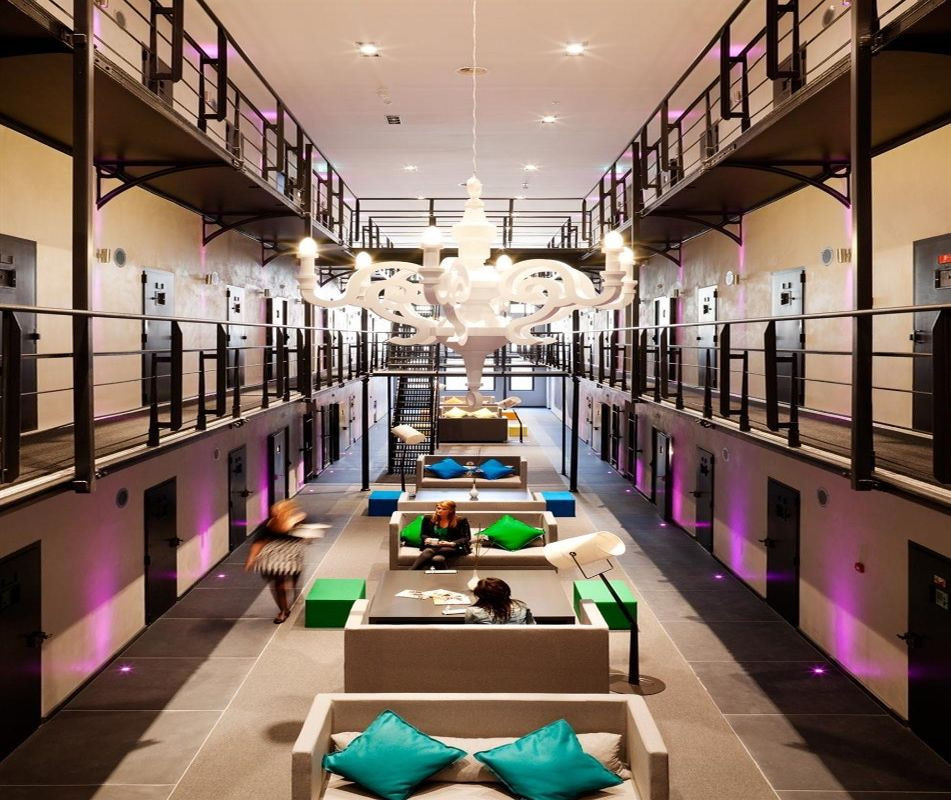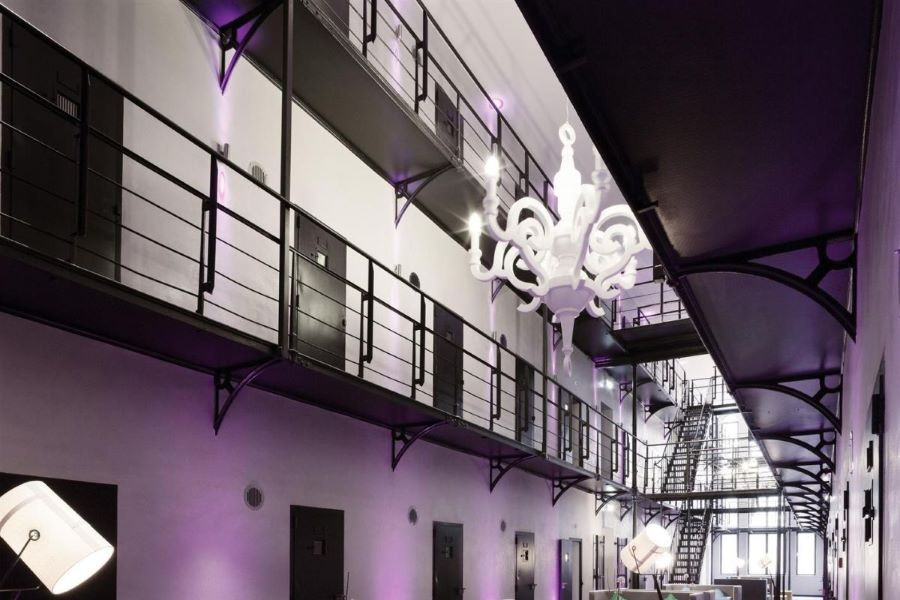The Netherlands Is Closing Its Prisons: Here Is Why!

©️ Hotel Het Arresthuis
Imagine a place where prisons are not just closing, but being transformed into creative workspaces, schools, and even trendy restaurants.
It might sound like the plot of a futuristic novel, but it’s happening right. Netherlands’ unique approach to criminal justice has led to an unprecedented trend: the closure and repurposing of prisons. What’s driving this dramatic shift, and what lessons can the rest of the world learn from it? Continue reading to find out.
Netherlands Prison Closures
The Wolvenplein prison in Utrecht stands as a creative workspace today, but its past as a correctional facility is evident through the heavy cell doors and barbed wire-topped walls.
In recent years, the Dutch government has closed nearly half of the country’s prisons. This includes the iconic Bijlmerbajes prison complex in Amsterdam, which was shuttered in 2016 and briefly reopened as a refugee center. This phenomenon is driven by a significant drop in crime rates and a shift in sentencing practices.
A Shift in Penal Philosophy
According to Wiebe Alkema, spokesperson at the Ministry of Justice and Security, a 2016 study highlighted that shorter sentences and a focus on how crimes impact society have contributed to a reduced prison population.
As of now, the Netherlands has one of the lowest incarceration rates in Europe, with only 61 prisoners per 100,000 people. In contrast, the United States has more than 10 times that number.

Alternatives to Incarceration
Dutch judges often opt for financial penalties or community service over prison sentences. Hilde Wermink, an assistant professor of criminology at Leiden University, notes that prison is not seen as an effective crime deterrent. Research supports this, showing that longer prison sentences do not correlate with lower crime rates. Community service and electronic monitoring, on the other hand, have been found to reduce re-offending rates.
Programs like the Compagnie project by Gevangenenzorg Nederland (Prison Care Netherlands) facilitate inmate reintegration by connecting them with potential employers. They also allow them to work outside the prison before their release. This humane approach has led to better post-prison outcomes for many participants.
Challenges and Criticisms
Despite these successes, there are challenges. Peter van der Laan is a professor and senior researcher at the Dutch Study Centre for Crime and Law Enforcement. He argues that the average prison time in the Netherlands is too short to allow for meaningful rehabilitation programs. Over half of custodial sentences are less than one month. This can cause significant disruption in inmates’ lives without providing the benefits of long-term rehabilitation.
Van der Laan suggests that judges should reduce the number of short sentences. According to him, they should reserve prison only for cases where there is a direct danger to the public. He also emphasizes the need for public education on the effectiveness of non-custodial sentences to shift perceptions of them being “soft” on crime.
Repurposing Prisons for Social Good
The decline in the prison population has led to innovative repurposing of old prison buildings. The former Bijlmerbajes prison housed a Syrian refugee-run pop-up restaurant before its demolition. The British School of Amsterdam now occupies a former prison building, benefiting from its security features and spacious layout.

Other repurposed prisons include a cultural business center in Leeuwarden, a hotel in Roermond, and even an escape game venue in Breda. These transformations not only address the practical issue of unused buildings but also provide valuable social services.
A Model for Reform
The Netherlands’ approach to criminal justice focuses on rehabilitation and alternative sentencing. It offers a potential model for other countries grappling with high incarceration rates. With reported crime continuing to decline and fewer repeat offenders, the Dutch experience suggests that a less punitive approach can be effective.
Amsterdam-based musician and social entrepreneur Rivelino Rigters had spent time in jail as a teenager. He believes that locking people up is not a solution.
His organization, Criminal Minded, mentors current and ex-prisoners, helping them rebuild their lives. Rigters’ experience underscores the importance of addressing the root causes of crime and providing support for reintegration.

The Netherlands’ strategy of closing prisons and repurposing them for social good reflects a broader shift towards a more humane and effective criminal justice system.
By focusing on alternative sentencing and rehabilitation, the Dutch model shows that reducing reliance on imprisonment can lead to better outcomes for individuals and society as a whole.
You may also like: This Korean True Crime Fan Killed Someone Out of Curiosity


